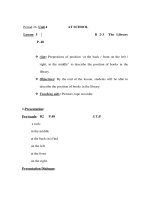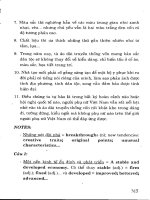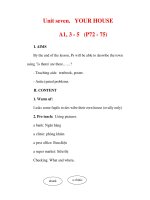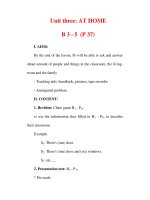4 3 5 our disappearing rain forest
Bạn đang xem bản rút gọn của tài liệu. Xem và tải ngay bản đầy đủ của tài liệu tại đây (5.75 MB, 12 trang )
Suggested levels for Guided Reading, DRA,™
Lexile,® and Reading Recovery™ are provided
in the Pearson Scott Foresman Leveling Guide.
Earth Science
Our Disappearing
Rain Forest
Genre
Expository
nonfiction
Comprehension
Skills and Strategy
• Generalize
• Fact and Opinion
• Text Structure
Text Features
•
•
•
•
Glossary
Heads
Map
Captions
Scott Foresman Reading Street 4.3.5
ISBN 0-328-13455-4
ì<(sk$m)=bdef h< +^-Ä-U-Ä-U
by Alma Ransford
Reader Response
Our Disappearing
Rain Forest
1. In a graphic organizer like the one below, write
three different kinds of problems that result in
rain forest damage. Then make a generalization
about all three problems.
Support
from text
Support
from text
Generalization
Support
from text
2. This text can be divided into three basic parts:
Part one is found on pages 3–9, part two is found
on pages 10–17, and part three is found on pages
18–19. Give each part a title and describe it in
your own words.
3. Look at the vocabulary words pollen and
pollinate. Explain the spelling change that occurs
when you add the suffix -ate to pollen.
4. How did the explanation of the layers of the rain
forest on page 6 help you understand what the
rain forest looks like and how it can be damaged?
by Alma Ransford
Editorial Offices: Glenview, Illinois • Parsippany, New Jersey • New York, New York
Sales Offices: Parsippany, New Jersey • Duluth, Georgia • Glenview, Illinois
Coppell, Texas • Ontario, California • Mesa, Arizona
Every effort has been made to secure permission and provide appropriate credit for
photographic material. The publisher deeply regrets any omission and pledges to
correct errors called to its attention in subsequent editions.
Unless otherwise acknowledged, all photographs are the property of Scott Foresman,
a division of Pearson Education.
Photo locators denoted as follows: Top (T), Center (C), Bottom (B), Left (L), Right (R),
Background (Bkgd)
Cover: ©Galen Rowell/Corbis; 1 © Yann Arthus-Bertrand/Corbis; 3 (T) © ML Sinibaldi/
Corbis, (BR) ©Pam Gardner/Frank Lane Picture Agency/Corbis; 5 (CR) © Staffan
Widstrand/Corbis, (B) © Craig Tuttle/Corbis; 6–7 (B) © Robert Holmes/Corbis; 7 (CR)
©Darrell Gulin/Corbis, (C) © Stuart Westmorland/Corbis; 8 © Charles O’Rear/Corbis; 9
(T) ©Patrick Siccoli/Corbis Sygma, (TRC) © Joe McDonald/Corbis, (BLC) © Kevin Schafer/
Corbis, (TLC) ©Michael & Patricia Fogden/Corbis; 10 © Yann Arthus-Bertrand/Corbis;
11 ©Gunter Marx Photography/Corbis; 12 (T) © Genevieve Leaper/Ecoscene/Corbis,
(BR) ©Galen Rowell/Corbis; 13 © Martin Rogers/Corbis; 15 © Collart Herve/Corbis
Sygma; 17 (T) ©Daniel Aguilar/Reuters/Corbis, (B) ©Daniel Morel/Corbis; 18 (BL) ©Hal
Horwitz/Corbis, (BR) © Gary Braasch/Corbis; 19 (TR) © Neiss James/Corbis Sygma, (Bkgd)
©Wolfgang Kaehler/Corbis
ISBN: 0-328-13455-4
Copyright © Pearson Education, Inc.
All Rights Reserved. Printed in the United States of America. This publication is
protected by Copyright, and permission should be obtained from the publisher
prior to any prohibited reproduction, storage in a retrieval system, or transmission
in any form by any means, electronic, mechanical, photocopying, recording, or
likewise. For information regarding permission(s), write to: Permissions Department,
Scott Foresman, 1900 East Lake Avenue, Glenview, Illinois 60025.
2 3 4 5 6 7 8 9 10 V0G1 14 13 12 11 10 09 08 07 06 05
What Exactly Is a Rain Forest?
There are many kinds of forests. Think of ones
where you live, or at a park you may have visited.
What is it that makes them wondrous? What
sets them apart? Sometimes, it’s the weather.
Tropical rain forests are warm, wet, and full of
living things. Everywhere you look, you can find
flying birds or see
where snakes have
slithered on the
ground. Strange
flowers fill the
air with their
fragrant scents.
3
North
America
Europe
Asia
Africa
Equator
South
America
Australia
Where in the World Are the Rain Forests?
Take a look at a map or globe. Rain forests are
found as far north as Canada. But we’re looking
at tropical rain forests. Tropical rain forests
are located between 22 degrees north and 22
degrees south of the equator. This area is called
“the tropics.” This means the rain forests stay
a steamy 75ºF–80ºF all year! Look at the map.
Can you find Asia, Africa, Australia, and South
America?
4
Home Sweet Home
Parts of these places are home to tropical rain
forests. This area covers just two percent of the
world’s land surface, but it’s home to more than
half of the wildlife on Earth! The largest rain
forest in the world—the one you’ve probably
heard of—is known as the Amazon rain forest.
It is in South America.
It stretches into parts
of eight different
countries and
covers two million
square miles.
Squirrel monkey
5
The Rain Forest Is Like a Layer Cake
Think of a cake with four different layers.
A rain forest is like that. The emergent layer is
at the top. Here, the trees are more than 225
feet tall, with thick branches that dangle down,
shading the vegetation below from sun and rain.
Below this layer is the canopy, which is thick
with shorter trees and vines. They hold fragrant
flowering plants, called epiphytes, on their
branches. The next level is the understory, which
has smaller saplings and shrubs. At the bottom,
you’ll find the dark forest floor. There are only a
few plants down here because there’s so
little light.
Rain forests are home to 30 million species
of animals and plants. That’s half the Earth’s
animals and two-thirds of its plants! A huge
variety of plants grow in any rain forest, and
there are still many plants and animals yet to be
discovered. But many of these plants and animals
are becoming threatened, and some are in
danger of disappearing forever.
6
Moss-Covered Tree
Orange Fungus
and Ferns
7
Lear’s Macaw
How’s the Weather?
Whether it’s sunny or cold, you can bet rain
forests have something to do with our weather.
Trees in the rain forest act like large sponges.
They draw water from the forest floor and
send it back into the air as mists or clouds. This
recycling of water helps to supply lakes and
rivers all over the Earth. This water cycle helps to
prevent droughts and disease.
Take a deep breath. Trees absorb the carbon
dioxide we exhale and turn it into oxygen we
need to breathe. Rain forests also help keep
the soil in place. The roots of trees act like
anchors, keeping topsoil from sliding down
mountainsides.
They Call the Rain Forest Home
The Amazon rain forest is home to more
species than anyone imagines, including parrots,
jaguars, monkeys, and piranhas. The Amazon
itself holds 20 percent of the Earth’s freshwater
supply.
8
Capybara
Jaguar
Piranha
Black Howler Monkey
9
10
Cutting down rain forest
Deforestation in Canada
The Rain Forest Air Is Our Air
When rain forests are cut down, there’s more
carbon dioxide in the air. How much carbon
dioxide is too much? The amount of carbon
dioxide has increased in the past 150 years. Many
scientists believe that this increase in carbon
dioxide has made the Earth’s overall temperature
warmer and the weather more extreme in many
places.
Disappearing Forests
Our rain forests are important.
Deforestation—the removal of trees from their
ecosystem—is a serious problem all over the
world today. But it’s not just rain forests that
have been lost. Canada is home to 10 percent
of the world’s forests, including evergreen and
pines. Yet every year, Canada cuts down millions
of trees.
11
Erosion in the mountains
More People, More Problems
The rain forests of Central and South America
are probably the hardest-hit. This is because
there are many people and not enough work
or food to go around. For example, beef cattle
can be raised on cleared land. The beef is cheap
to raise and can be shipped to North America,
China, and Russia for a good profit. Yet for every
pound of beef, 200 square feet of forest must be
cleared. Since the early 1980s, Costa Rica has lost
some of its forests to cattle ranches.
How Do Forests Die?
“Forest death” happens in the mountains
when trees are cut down and not replaced.
Without trees, soil erodes. Flowers disappear.
And since there’s no pollen from the flowers,
birds and bees can’t pollinate the flowers, so
they disappear too. When there are no trees
holding soil in place, deadly avalanches and
mudslides can happen. Many forests have been
cut down since 1960. There has been more and
more flooding. Also, there are so many people
that farmers are forced to move further up into
these mountains, where even more erosion and
landslides occur.
A cattle ranch in Costa Rica
12
13
Save Our Soil!
When rain forests are cut down, the soil
suffers. The grass dies off from lack of water, and
the ranch land may turn to desert. This forces
farmers to move on. They need more land to
farm, and they must destroy more rain forests to
get it.
Another cause of rain forest destruction is
logging. Mahogany and teak trees, native to rain
forests, are valuable woods for furniture making.
Other trees are cut down to make charcoal, an
inexpensive source of fuel. When too many trees
are destroyed, the forests have trouble staying
healthy.
Fruits and vegetables now grow in areas that
used to be home to rain forests. Bananas, palm
oil, pineapples, sugar cane, tea, and coffee are
just some of the crops that grow well in tropical
areas. Forests are cut down to make way for
these crops because they can make money for
farmers. Yet the soil eventually becomes poor, so
farmers must move on and clear more forests.
14
Chemicals pollute the water.
Keeping Ourselves and the Rain Forest Healthy
Mining, oil production, and dam building
have also ruined rain forests. Poisonous chemicals
that are used in gold and copper mining find
their way into rivers and pollute the water. They
poison the fish, which poison the birds that eat
them. For example, mercury is used to mine gold
in the Amazon. But mercury is also a poison to
the creatures of the rain forest.
Deforestation seems to make the
temperatures around the world rise. Due to
rising temperatures, animals and plants may
die out or become extinct. Sea levels may rise.
Flooding may increase.
15
The Danger of Losing Our Rain Forest
What can happen to deforested areas? Here
are a few examples. In 2001, a deadly earthquake
in the Central American nation of El Salvador
caused mudslides that killed at least 1,000
people. Would these mudslides have occurred if
a nearby dappled-green rain forest hadn’t been
cleared away? Many experts don’t think so.
In September 2004, violent tropical storms and
hurricanes caused deadly floods in the Caribbean
nation of Haiti. Disaster workers and others
blamed the deaths of more than 1,000 people on
mudslides and not enough topsoil. Why wasn’t
there enough topsoil? Because the rain forests
had been cleared—often to make charcoal. In
1950, about 25 percent of Haiti was covered in
green forests. Today, barely 1 percent of the
country is forested.
Top right: In 2004, deadly floods in Haiti caused people to
flee their homes.
Bottom right: When the rain forests are cleared, topsoil is
lost.
16
17
Problems and Solutions
Today in the South American nation of
Brazil, people are fighting over the building of
a highway. This road would connect the state
of Mato Grosso to a port on the Amazon River.
Farmers are eager to pave a 435-mile stretch
of road to save money and time in getting
their products to market. Local governments
and residents are happy about the road. They
hope it will bring new supplies and services.
Environmentalists aren’t so happy, however.
Road-building may be one of the Amazon’s worst
enemies because it means that more forests will
be lost. The solution? Environmentalists and local
officials will have to work together to find an
answer.
Let’s Save the Rain Forest!
Working together is the only
way to save the rain forests. Each
of us can help. Farmers can begin
to grow coffee, chocolate, and
bananas in a way that is safe for
the environment. Paper comes
from rain forest trees, and we can
save trees by using less paper and reusing paper
instead of throwing it away. A group called The
Rain Forest Alliance has a program called Adopt
a Rain Forest to help slow down deforestation.
This will mean slithering snakes and nesting birds
will still be able to call the rain forests home.
The wide Napo River flows
between banks covered with
dense rain forest.
18
19
Glossary
Reader Response
canopy n. the upper
layer, or roof, of the
forest made up of the
tops of trees.
pollen n. powderlike
materials from
flowers that allow
for fertilization.
dangle v. to hang or to
cause to hang loosely.
pollinate v. to fertilize
by transferring pollen.
dappled adj. spotted.
slithered v. moved
along by gliding.
fragrant adj. sweet- or
pleasant-smelling.
wondrous adj.
wonderful.
1. In a graphic organizer like the one below, write
three different kinds of problems that result in
rain forest damage. Then make a generalization
about all three problems.
Support
from text
Support
from text
Generalization
Support
from text
2. This text can be divided into three basic parts:
Part one is found on pages 3–9, part two is found
on pages 10–17, and part three is found on pages
18–19. Give each part a title and describe it in
your own words.
3. Look at the vocabulary words pollen and
pollinate. Explain the spelling change that occurs
when you add the suffix -ate to pollen.
4. How did the explanation of the layers of the rain
forest on page 6 help you understand what the
rain forest looks like and how it can be damaged?
20









